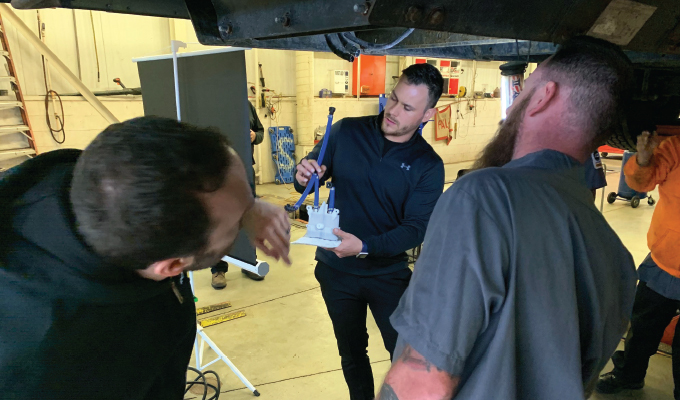By Todd Mouw
For fleets looking to adopt alternative fueled vehicles, training on the maintenance plays a key role. It’s one thing to choose an alternative to gasoline or diesel, but a crucial component is to make sure it runs after it’s been delivered. That includes the ability to have it serviced. Your technician or local service station/dealership may know how to fix and maintain your truck model, but they’ll need to know the specifics on the alt-fuel parts, too.
Here are things to look for in a training program when adopting an alternative fuel—like propane autogas or compressed natural gas—and how that training should tie back to ongoing maintenance.
AVAILABLE TRAINING
If the fuel system manufacturer offers training, find out what type they offer. Training courses can be both online or in person. If online, find out what topics are covered and if certification can be attained. Can questions be asked? Are there tests to gauge knowledge? Is the online training thorough enough that a technician can make the repair without hesitation? It’s very doubtful that you’ll be able to find a YouTube video with enough information to show you how.
Some companies offer online training resources, making it convenient to learn at your own pace. Look for them to offer demonstration videos on service and diagnostic procedures or service manuals to simplify diagnostics steps, speed up repairs, and minimize downtime. Do they have any technical publications with easy-to-follow instructions? These will give users the flexibility to complete a training program and provide all information in one place.
On-site training at your fleet’s location is the most specialized type of training. The biggest benefit of on-site training is that you have the trainer’s full focus on your specific model of truck, and technicians can ask specific questions about your fleet vehicles and specific requirements.
Also look for factory workshop training where you can visit the manufacturer’s facility to learn in small groups with hands-on instruction. This may be as beneficial as on-site training as you’ll interact with people from other organizations, too.
Some manufacturers have certified service centers where training can be performed. Working with a service center may save your fleet the space and expenses from having a separate repair garage.
Be sure to ask the cost of these training programs and if there’s a cap on how many technicians can be trained.
If training is not available, you will be on your own to figure out how and where to service your vehicle.
REPAIR ASSISTANCE
What if you don’t have an in-house mechanic? Don’t worry. Your vehicles’ OEM can direct you to a dealership that has training in your type of fuel system. Or even better, find out if the alternative fuel vehicles’ fuel system manufacturer offers assistance. For instance, ROUSH CleanTech in Livonia, Michigan, trains and equips an extensive service network with the tooling and service diagnostic information required to service and maintain its propane autogas fuel systems. The company’s in-house customer success team is made up of field service engineers to take care of customer training and service needs. ROUSH CleanTech helps fleets handle warranty parts and has more than 600 approved service centers across the country.
ADDITIONAL REQUIREMENTS
Always refer to the vehicle owner’s manual for regular maintenance even with an alt-fuel model. Follow the manufacturer’s recommended oil change intervals, even if you may think it isn’t necessary. Many alt fuels, like propane autogas, burn so clean that often your oil will still look new when it’s time to change it. That helps keep your engine clean, but the oil should still be changed at the recommended interval. Make sure you use the oil levels with fuel filters changed on schedule.
Continue with basic maintenance—changing and inspecting the spark plugs, air filters, battery, etc., at proper intervals—just like you would with conventionally fueled vehicles. Plus, you won’t need to purchase and install pricey diesel aftertreatments, which aren’t required on alt-fuel models.
Even after you’ve gone through training, if you have further questions about the alternative fuel system in your truck, contact the system manufacturer. They should be able to help you with the system components and might recommend another workshop to further your knowledge. For all questions not related to the fuel system, contact the vehicle manufacturer directly.
ABOUT THE AUTHOR
Todd Mouw is president of ROUSH CleanTech, an industry leader of advanced clean mobility technology. Mouw has served as president of the NTEA Green Truck Association. Reach him at support@roushcleantech.com or 800.59.ROUSH. Find out more, visit www.roushcleantech.com.




